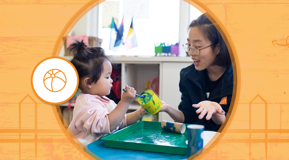Engaging your child in play

Play is central to children’s development and has an important role in developing children’s physical, social, communication and language skills.
For many children who have a disability or developmental delay, playing is not always easy. This can be for many reasons including difficulty following instructions or difficulty following the rules of the game, or having communication or physical challenges.
The key to supporting your child to engage in play is to understand the stages of play.
Here are top tips from our Occupational Therapists for encouraging your child to explore and move through the stages of play:
- Start with what your child loves to do. For example you could use toys or activities that you know are of interest to your child to encourage play, or if there is a toy or activity that your child loves in one setting, take it out into another.
- Show what an unfamiliar toy does and how it can be used. Make sure you get down to your child’s level while modelling and use simple, step by step instructions.
- Praise and encourage any responses you get from your child. The praise should clearly state what you are praising them for.
- Alternate sit-down, structured play with more active , free play.
- If the game has too many rules, break it down to simpler steps.
- Use everyday moments to engage you child with play, playing dress ups will help your child to dress themselves.
- Understand that play won’t always go to plan – have some back up activities that you know your child loves if the new activity gets too challenging.
Remember it can take a lot of effort for a child to engage in play, so plan regular breaks.









